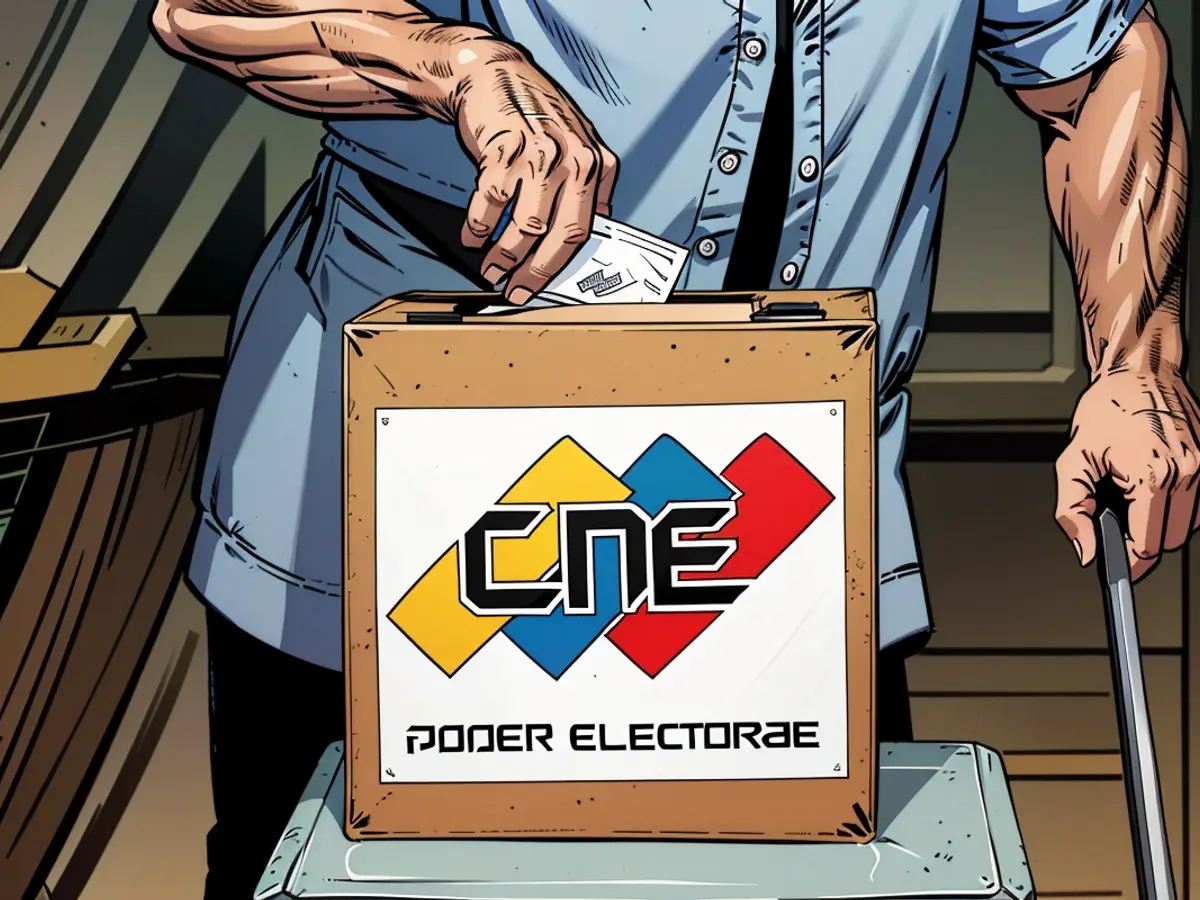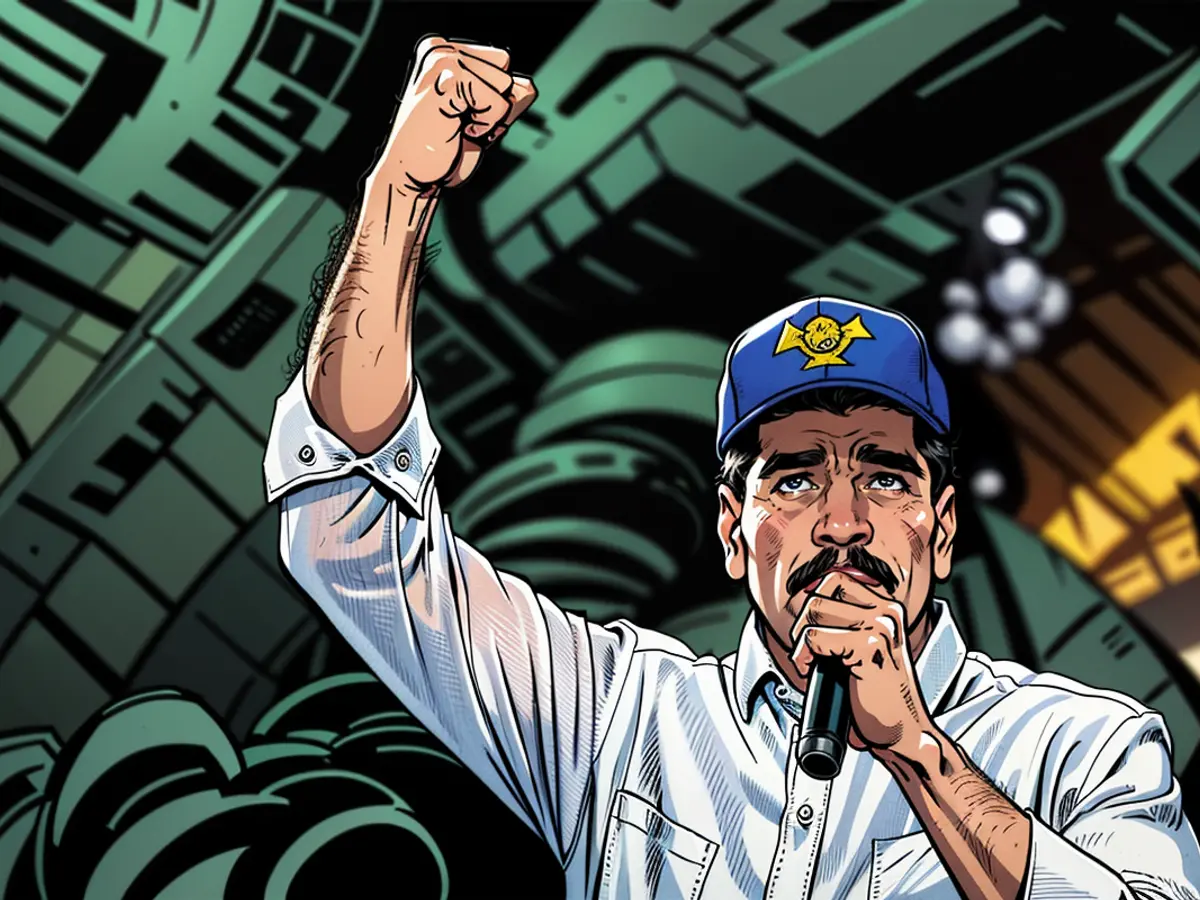In Venezuela, the 'little commando' faction challenged Maduro's authority. They could now spearhead a fresh wave of migration.
CNN spoke to around six Venezuelans who have recently fled their country, some resorting to swapping clothes or hiding in bushes to evade detection while traveling. Many chose to migrate illegally, traveling at night and hiding during the day to avoid numerous checkpoints set up by Venezuelan government forces. Some reported being allowed to pass unchecked by officers believed to be sympathetic to the opposition's cause. Most requested anonymity out of fear that government forces would retaliate against their loved ones if they discovered they had left the country.
One woman, who left behind her 84-year-old mother, shared her reason for leaving: "I left my mom... my husband did the same. My mom told me: ‘Be strong my love, everything will be alright; joy will come back to Venezuela, I’ll be here waiting for you. If I’m not here anymore by the time you come, I’ll know at least you are a free person,'" she said, accompanying her husband and son on their journey.
Her alleged misdeed in Venezuela? Assisting in the collection of more than 1,200 "actas" – printed voting machine receipts that have become crucial evidence in the opposition's claim that the election was rigged by Maduro, the authoritarian leader who has ruled with an iron fist since Hugo Chavez's death in 2013.
A pre-election poll predicted that up to a third of Venezuela's population might consider leaving the country if Maduro was re-elected. Interviews with political dissidents living in Colombia, Ecuador, Chile, and the United States suggest that they might constitute a new wave of migration, fleeing renewed repression at home.
Viviana Save, an opposition activist from the Andean state of Trujillo, began experiencing intimidation well before the election. Speaking from a secret location outside Venezuela, Save revealed she had been moving from house to house since July 20 due to fears of arrest by government forces.
Save had been coordinating thousands of campaign teams called "comanditos" ("little commandos") to mobilize voters opposed to Maduro's rule. They were also tasked with gathering actas – the printed results from each voting center – aimed at ensuring a fair election and allowing the opposition to independently count votes.
Government forces would position trucks in front of her home as a threatening tactic, Save recalled. "They would park on the other side of the street, a truck from the (intelligence service) SEBIN, or the special forces, with the windows down and the officers wearing balaclavas or skull masks to scare my family," she said.
Following Maduro's declared victory in the election, which raised suspicions in the opposition and abroad, Save and thousands of other Venezuelans took to the streets. Government forces have since arrested at least 2,000 opposition sympathizers, with activists' homes in certain neighborhoods in Caracas marked with black Xs. At least 25 civilians and one soldier have died in political violence.
Maduro himself ordered the opening of two new prisons to accommodate the arrested, dubbing the widespread police operation to detain as many protesters as possible "Operation Knock-Knock," mimicking the sound of special forces knocking on opposing activists' doors in the middle of the night to arrest them.
Save was personally targeted as the crackdown expanded. "Governor Gerardo Marquez published a sign with my face stating that I was wanted for terrorism," she recalled, denying any involvement in terrorism or incitement to violence.
When contacted by CNN, the attorney general, Tarek William Saab, promised to investigate Save's case, but has yet to provide a response. "I really felt they would get to me, sooner or later," Save said.
Challenging the official version
According to Venezuela's electoral council – which is pro-government – Maduro won his re-election with a little over 50% of the vote.
However, Venezuela's opposition coalition, along with electoral observers from the United Nations and the Carter Center, have called into question the council's figures. Several countries, such as the US and the EU, have urged Venezuela to share detailed results per polling station.
Meanwhile, Venezuela's opposition has published over 80% of the actas printed and obtained from voting machines across the nation, totalling around 25,000 documents. Analysts suggest this evidence partially shows that the opposition candidate, Edmundo Gonzalez Urrutia, actually defeated Maduro.
Disputing the official election results carries a heavy cost. Although publishing election tallies is permitted under Venezuelan law, the government has accused the opposition of distributing false actas without presenting proof. Last week, Attorney General Tarek William Saab summoned Gonzalez Urrutia for interrogation, accusing him of misusing the Electoral Council's functions.
Besides widespread arrests, dozens of activists and journalists have claimed that the Venezuelan government has confiscated their passports to prevent them from leaving the country. The Venezuelan passport office did not respond to CNN's queries.
Volunteers and election witnesses who gathered the voting machine tallies have been specifically targeted by government repression, activists claim.
"Everyone who was involved in our effort is in hiding, either here or abroad," said another opposition source involved in documenting the tallies. "The acta became like kryptonite because it proves the government is lying," the source said.
Opponents' presidential candidate Gonzalez Urrutia and opposition leader Maria Corina Machado are currently in hiding, with Maduro publicly threatening them with detention.
A New Existence Away from Home
Over 7 million Venezuelans have abandoned their country since Maduro took over in 2013, as per the United Nations. Experts foresee an additional large number of individuals following suit in the upcoming months.
Save's significant event occurred on August 2, five days post-election, she recounts. Constantly on the move due to fear of arrest, she was traveling through the countryside when her vehicle broke down. A police patrol arrived shortly afterward on a motorcycle.
Save revealed to CNN that she hid behind a shack while bystanders interacted with the police to buy some time. She then hiked up a hill and remained concealed among banana trees for several hours.
"I truly believed that was my day; hiding there, and I was certain they would seize me and transport me to the Helicoide," Save told CNN, gesturing towards the maximum-security prison in Caracas where the Maduro government keeps multiple dissidents.
Approximately a week later, she left the country incognito.
"At one point, I had to hop on a motorcycle and wear flip-flops because they wanted me to come off as a local returning home, but thank goodness it went as planned – I am now free," she told CNN.
Another dissident revealed to CNN that they departed their home by motorcycle, traveling at night while hiding and resting during the day after receiving a tip-off about upcoming arrests by the security forces.
"When they informed me the government planned to apprehend me, I merely fled. I didn't prepare anything: four days on the road with only a single pair of underpants," they told CNN, requesting anonymity out of fear of retaliation against their family, who remained in Venezuela.
Representatives of certain countries in the Americas have established restrictions on Venezuelan travelers in an effort to regulate migration flows in recent years. The majority of activists cited in this article shared their desire to return to Venezuela as soon as possible and were not intent on seeking asylum elsewhere.
Save entertains the thought of attempting to get to the United States, where numerous opposition politicians have taken refuge. However, her true aspiration is to return to Trujillo, where she believes most individuals support her – even the soldiers assigned to uphold Maduro's rule.
"The government never envisioned we could organize our people to this extent. They instructed the military not to permit our witnesses to complete the actas, but if we garnered 92% of them, it suggests such orders were disregarded," she said. "The people are on our side."
The ongoing political turmoil in Venezuela has led to a significant increase in migration, with estimates suggesting a large number of additional individuals planning to leave in the near future. This mass exodus has become a global concern, with representatives from various countries in the Americas implementing travel restrictions to manage migration flows.
Despite the risks and challenges, many Venezuelan dissidents have expressed their desire to return to their homeland as soon as possible, despite the dangers they may face. Even in the midst of fear and uncertainty, their hope lies in the belief that their support base extends beyond the government forces, reaching even soldiers assigned to uphold Maduro's rule.








